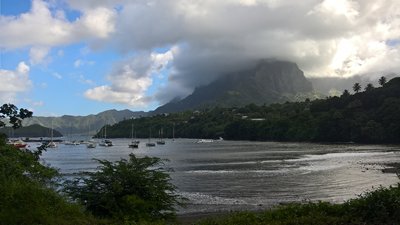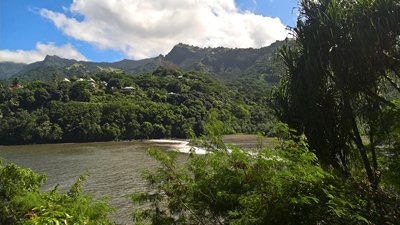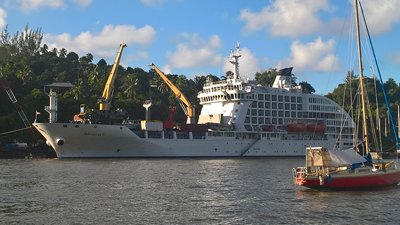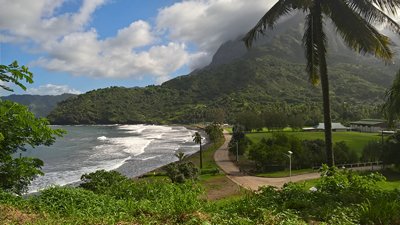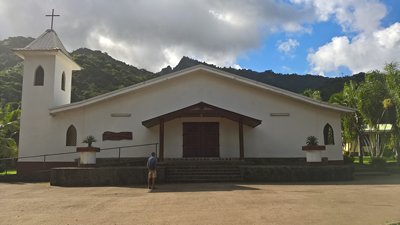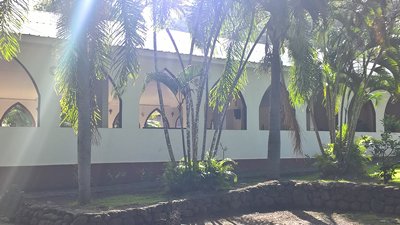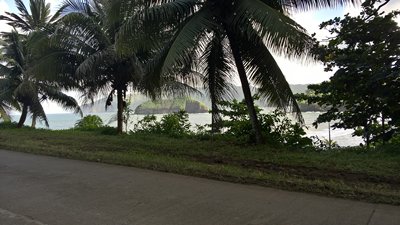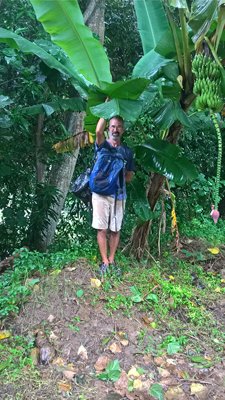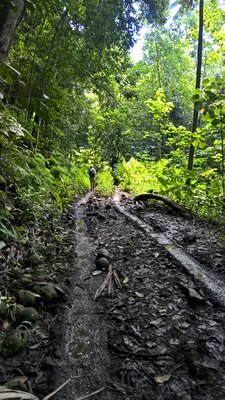Hiva Oa

|
Hiva Oa (population about 2,500) is known as the burial place of Gaugin and Jacques Brel(who?) and (I read somewhere) as the last place in French Polynesia to practice cannibalism. Our anchorage in Tahauku Bay is in a lovely valley, surrounded by hills covered in forest, with only an occasional building in sight. It is overlooked by Mount Temetin, which has been a brooding presence half hidden by cloud for much of our visit. The bay is sheltered from the west by what appears to be a massive sunken volcanic crater, unfortunately the swell rolls in uninterrupted from the East and South East, which makes this a rolly anchorage – a bit of a nuisance for Phil, who had to go to the top of the mast to fix our navigation light, which stopped working on the passage.
Mount Temetin, its head in cloud, over the anchorage
The top end of Tahauku Bay, surrounded by forest clad hills This morning the small anchorage was made even smaller when ‘Aranui 5’ arrived. This is one of the two interisland cargo vessels, but this one has passenger accommodation in the stern. In effect it is a mini cruise ship, and while the cargo is being off-loaded at each island, the passengers get taken to see the sights. Her arrival at 5am caused consternation and some hasty movement among those who were anchored too close to the dock.
Aranui 5, half cargo vessel, half cruise ship It is a 2.5 km walk to the town of Atuona, where we had to check in with the local Gendarmerie, with amazing views of the bay and surrounding mountains. There is no public transport here, but hitching is supposed to be easy and safe – we haven’t tried it as after 3 weeks at sea we welcomed the walk. The town is tiny, but has 4 supermarkets, and the most beautiful church. Its a simple white structure with arched windows down the side, but there is no glass in the arches, so the church is open to the air.
Atuona Beach – popular with locals for surfing, and said to have inspired Gaugin
The church at Atuona – simple but so beautiful
Its all just so photogenic. This is a place where, despite modern houses and cars, the difference in culture is evident. While we were waiting in the Gendarmerie for our passports to be copied, a local man appeared – possibly from the custody cells, he was short, but traditionally built, covered in Tatoos, and with his long hair in a pony tail, and he had a flower behind his ear. Our anchorage is below an army base, and we have heard drumming and chanting/singing on a fairly regular basis. This morning we saw a platoon of soldiers slow marching towards their base, and chanting as they went – so musical. We have had conflicting information as to the season here, but if rain makes a rainy season, it was certainly that when we first arrived, with heavy downpours, particularly at night. We were caught in one on the way to town on Monday and had to take what shelter we could to avoid arriving completely soaked.
Phil shelters from the rain under a banana leaf Today, we went looking for the Petroglyphs (rock carvings) that are supposed to be found in the forest in the valley above the anchorage. We had a muddy but enjoyable walk up a paved road, track and then footpath, but all we found was someone’s coconut plantation and an animal trap. Most of the sights here are not signposted, so require a guide to find them. The Lonely Plant guide suggests that you ‘ask at your hotel’ for tourist information!
A muddy track leading nowhere Sarah Tadd |
